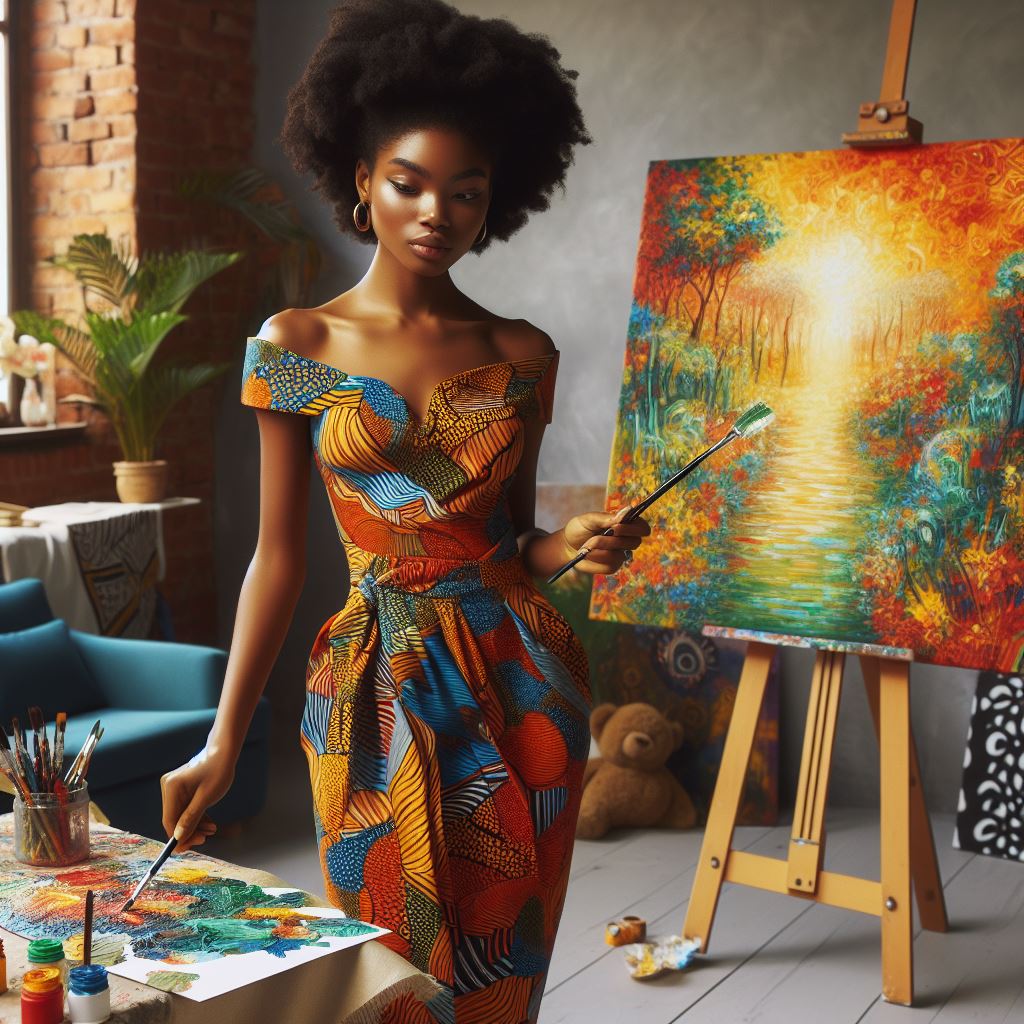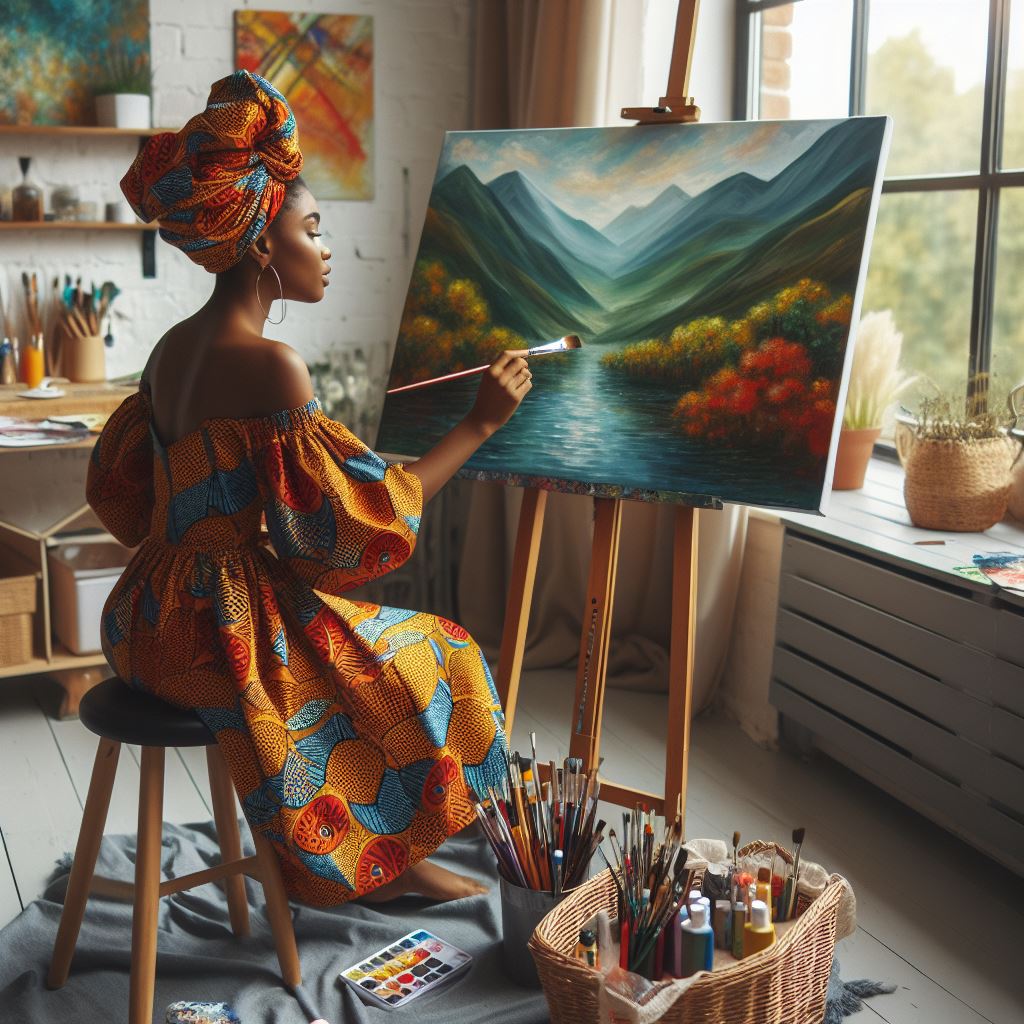Introduction
Art therapy, a profound therapeutic modality, utilizes creative expression to foster emotional healing and self-discovery.
In Nigeria, amidst its diverse cultural tapestry, art therapy emerges as a potent tool for addressing mental health challenges.
Art serves as a universal language, transcending verbal barriers, allowing individuals to articulate emotions, traumas, and aspirations.
By engaging in artistic processes, individuals embark on a journey of self-exploration, unveiling hidden aspects of their psyche.
Art therapy provides a safe space for individuals to navigate complex emotions, facilitating healing and personal growth.
This approach empowers individuals to confront unresolved issues, fostering resilience and inner strength.
Moreover, art therapy nurtures a sense of agency and empowerment, allowing individuals to reclaim ownership of their narratives.
Through the act of creation, individuals in Nigeria find solace, catharsis, and hope amidst life’s adversities.
In this blog section, we will delve into the multifaceted dimensions of art therapy in Nigeria, exploring its transformative potential.
History of Art Therapy in Nigeria
The roots of art therapy in Nigerian culture and traditions
Art therapy in Nigeria is deeply intertwined with the country’s rich cultural heritage and diverse traditions, dating back centuries.
Throughout Nigeria’s history, art has been revered not only as a form of expression but also as a sacred medium for healing, spirituality, and communal cohesion.
The roots of art therapy can be traced to ancient rituals and ceremonies practiced by various ethnic groups, each with its own unique artistic traditions and healing practices.
For example, among the Yoruba people, art is intricately woven into religious ceremonies, such as the Egungun festival, where elaborate masks and costumes are used to commune with ancestral spirits and seek guidance and healing.
Similarly, the Igbo people have a long tradition of creating intricate sculptures, masks, and textiles for ceremonial purposes, believing that these artistic expressions possess spiritual power and healing properties.
Across Nigeria’s diverse cultural landscape, art has always been more than just aesthetics; it is a form of communication, a means of storytelling, and a vehicle for spiritual connection.
Art has been used for healing in Nigerian communities
In Nigerian communities, art has been a vital tool for healing, providing individuals with a means of processing trauma, expressing emotions, and finding solace in times of adversity.
During times of conflict, displacement, or natural disasters, communities often turn to art as a form of collective healing and resilience.
Artistic expressions, such as dance, music, storytelling, and visual arts, play a central role in healing rituals and ceremonies, serving as a bridge between the physical and spiritual worlds.
For instance, the rhythmic drumming and dancing during traditional festivals not only celebrate cultural heritage but also promote community bonding and emotional release.
In addition, visual arts, such as painting, sculpture, and pottery, allow individuals to externalize their internal struggles, transforming pain and suffering into objects of beauty and meaning.
Through artistic expression, individuals in Nigerian communities find strength, hope, and a sense of identity amidst life’s challenges.
Basically, the roots of art therapy in Nigerian culture run deep, drawing on centuries-old traditions of artistic expression and healing practices.
Today, art continues to be a powerful force for healing, resilience, and cultural preservation in Nigerian communities.
Read: Developing Critical Thinking in Language Arts
Benefits of Art Therapy
The psychological and emotional benefits of art therapy
Art therapy offers a unique pathway to healing, providing individuals with a safe and expressive outlet for their emotions.
Through the creative process, expressive therapy enables individuals to explore and confront difficult feelings, thoughts, and experiences in a non-verbal manner.
Engaging in artistic activities stimulates various regions of the brain, promoting relaxation, mindfulness, and self-awareness.
Art therapy fosters self-expression and creativity, empowering individuals to communicate their innermost thoughts and emotions freely.
Moreover, the act of creating art can be inherently rewarding, boosting self-esteem, confidence, and a sense of accomplishment.
By engaging in art therapy, individuals develop coping skills, resilience, and a deeper understanding of themselves and their emotions.
Art therapy can help individuals in coping with trauma and stress
For individuals coping with trauma and stress, expressive therapy provides a therapeutic framework for processing and integrating difficult experiences.
Artistic expression allows individuals to externalize and transform their trauma into tangible forms, facilitating the healing process.
Through art therapy, individuals can gain insights into their trauma, identify coping strategies, and develop healthier ways of managing stress.
Art therapy offers a safe and supportive environment for individuals to explore their trauma at their own pace, without judgment or pressure.
The creative process of art-making can be inherently soothing and cathartic, providing individuals with a sense of relief and release.
Moreover, expressive therapy encourages mindfulness and present-moment awareness, helping individuals to regulate their emotions and reduce anxiety.
Essentially, art therapy offers a holistic approach to healing, addressing the psychological, emotional, and spiritual aspects of trauma and stress. Through creative expression, individuals can reclaim their agency, resilience, and sense of well-being.
Read: Student Experiences: Life in Communication Arts
Nigerian Art Forms in Therapy
Art therapy is a powerful tool that harnesses the healing properties of art to improve mental health and overall well-being. Nigerian art forms hold a rich cultural significance that can be integrated into therapy to provide a unique healing experience.
Various Nigerian art forms that can be used in art therapy
Nigeria’s rich cultural heritage offers a diverse array of artistic traditions that can be incorporated into art therapy.
Traditional Nigerian art forms such as beadwork, pottery, textile design, and mask-making provide therapeutic avenues for self-expression and healing.
The intricate patterns and vibrant colors of Nigerian textiles, known as “aso oke” or “adire,” offer a tactile and visual medium for artistic exploration.
Similarly, beadwork, with its meticulous craftsmanship and symbolic significance, allows individuals to create intricate designs that reflect their personal narratives.
Pottery, another traditional Nigerian art form, offers a hands-on experience that promotes mindfulness, relaxation, and emotional release.
Furthermore, mask-making, a centuries-old tradition among Nigerian cultures, allows individuals to explore identity, transformation, and hidden aspects of the self.
Traditional Nigerian art techniques have been integrated into modern therapy practices
In modern therapy practices, traditional Nigerian art techniques have been adapted and integrated into expressive therapy sessions to promote healing and self-discovery.
Art therapists draw upon the symbolism, materials, and processes of traditional Nigerian art forms to facilitate therapeutic interventions.
For example, the use of beads in therapy sessions can symbolize the interconnectedness of emotions and experiences, allowing individuals to create beaded artworks that reflect their inner journey.
Similarly, the tactile nature of pottery provides individuals with a sensory experience that promotes grounding, mindfulness, and emotional regulation.
Transform Your Career with Expert Guidance
Get personalized mentorship consulting that’s tailored to your unique path. Our expert advice is actionable and exclusive.
Get StartedTextile design techniques, such as tie-dyeing and weaving, can be used to explore themes of resilience, transformation, and cultural identity.
Furthermore, mask-making in therapy sessions allows individuals to explore different aspects of their identity, emotions, and persona, providing a safe space for self-expression and exploration.
By integrating traditional Nigerian art techniques into modern therapy practices, art therapists honor cultural heritage while providing individuals with effective tools for healing and personal growth.
All in all , the rich artistic traditions of Nigeria offer a wealth of resources for expressive therapy, promoting holistic well-being and cultural connection.
Read: How to Apply for Communication Arts Programs

Uncover the Details: Nigerian Art Exhibitions You Must Visit
Find Out More: The Future of Nigerian Fashion Design Industry
You Might Also Like: Community Engagement in African and Asian Studies
Case Studies of Art Therapy in Nigeria
Real-life examples of how art therapy has been successful in healing individuals in Nigeria
In Nigeria, expressive therapy has transformed the lives of countless individuals, offering hope, healing, and empowerment.
One real-life example is the story of Ada, a survivor of gender-based violence who found solace and healing through expressive therapy.
Ada processed her trauma, regained self-worth, and rebuilt her life with newfound resilience through painting and storytelling.
Similarly, Yusuf, a young man struggling with depression, found relief and purpose through pottery therapy sessions.
Yusuf discovered a sense of accomplishment and joy by shaping clay into beautiful sculptures, gradually overcoming despair.
Real-life examples demonstrate art therapy’s transformative power in Nigeria, empowering individuals to reclaim their lives and pursue healing.
The impact of art therapy on mental health and well-being
Art therapy has a profound impact on mental health and well-being, offering a holistic approach to healing and self-discovery.
Through creative expression, individuals can explore and process complex emotions, trauma, and stress in a safe and supportive environment.
Art therapy promotes self-awareness, emotional regulation, and resilience, empowering individuals to cope with life’s challenges more effectively.
Moreover, engaging in artistic activities stimulates the release of neurotransmitters such as dopamine and endorphins, promoting relaxation and reducing anxiety.
Art therapy fosters connection and belonging, enabling individuals to share experiences and support each other in healing.
Overall, expressive therapy offers a transformative pathway to healing, promoting mental health, resilience, and well-being in Nigeria and beyond.
Read: Famous Nigerian Alumni of Communication Arts Programs
Gain More Insights: Top Nigerian Universities for Fine and Applied Art
Learn More: English Language Programs: Admission Requirements
Challenges and Opportunities in Art Therapy in Nigeria
In Nigeria, promoting art therapy faces several challenges due to cultural beliefs, lack of awareness, and inadequate resources.
The challenges faced in promoting art therapy in Nigerian society
Promoting art therapy in Nigerian society comes with its share of challenges, ranging from cultural stigmas to limited resources.
Stigma around mental health issues can deter individuals from seeking or accessing therapy services, including art therapy.
A shortage of trained art therapists in Nigeria limits service availability in urban and rural areas.
The lack of awareness about expressive therapy benefits among professionals hinders its widespread adoption.
Cultural misconceptions may hinder the acceptance of expressive therapy, as some view it as ineffective compared to traditional therapy.
The opportunities for expanding art therapy programs in Nigeria
Despite these challenges, there are opportunities for expanding expressive therapy programs in Nigeria and increasing access to mental health services.
One opportunity lies in raising awareness and destigmatizing mental health issues through education and advocacy efforts.
Training programs for art therapists can be established to meet the growing demand for qualified professionals in Nigeria.
Collaborations between government agencies, non-profit organizations, and mental health institutions can also help to increase funding and support for expressive therapy initiatives.
Moreover, integrating expressive therapy into existing healthcare and education systems can help to normalize its practice and make it more accessible to diverse populations.
Developing community-based expressive therapy programs can reach underserved populations and address specific mental health needs.
Promoting art therapy in Nigeria faces challenges, yet opportunities exist to expand programs and mental health services.
Conclusion
Art therapy stands as a beacon of hope within Nigerian healing practices, offering a profound and culturally resonant approach to emotional well-being and healing.
In a country rich with diverse cultural traditions and artistic expressions, expressive therapy serves as a bridge between tradition and modernity, honoring Nigeria’s heritage while addressing contemporary mental health needs.
Its importance lies not only in providing a therapeutic outlet for individuals but also in fostering resilience, self-expression, and community connection.
By integrating traditional Nigerian art forms and techniques into therapeutic practices, expressive therapy taps into the collective wisdom and creativity of the nation, offering a holistic approach to healing that encompasses mind, body, and spirit.
As Nigeria continues to grapple with mental health challenges, the potential for growth and development of expressive therapy in the country is vast.
In the end, expressive therapy holds immense promise for the future of healing in Nigeria.
By embracing its transformative power and leveraging Nigeria’s rich artistic heritage, expressive therapy can empower individuals, strengthen communities, and contribute to a brighter and more resilient future for all.




